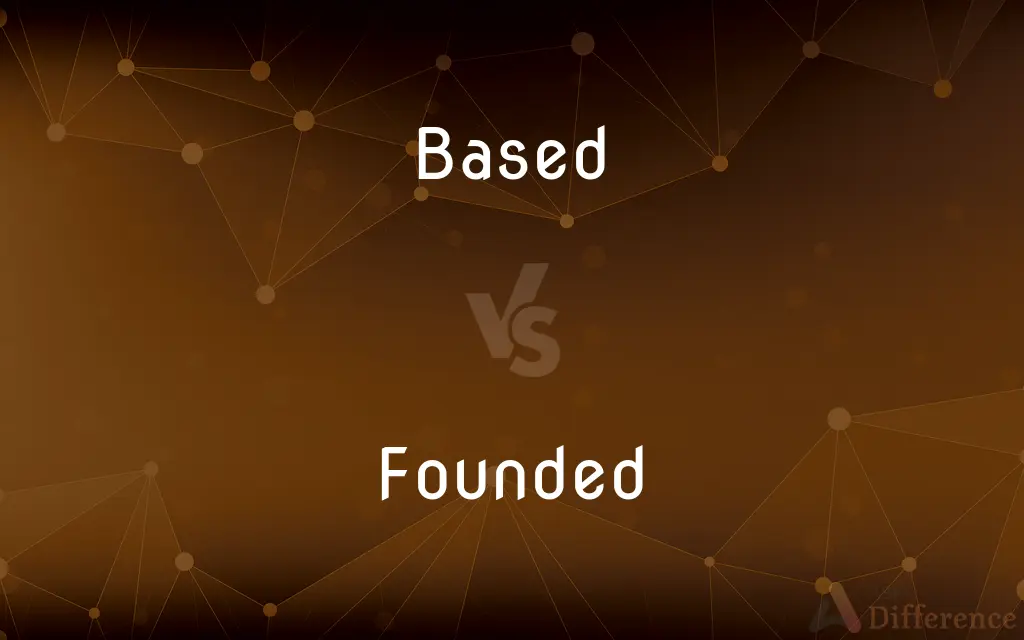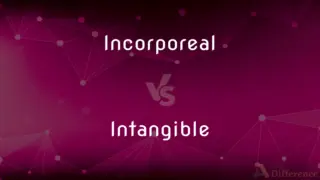Based vs. Founded — What's the Difference?
By Fiza Rafique & Urooj Arif — Updated on April 28, 2024
"Based" refers to the location or setting where something is primarily located, while "founded" pertains to the establishment or creation of something.

Difference Between Based and Founded
Table of Contents
ADVERTISEMENT
Key Differences
"Based" is often used to specify the geographical or operational center of an entity, such as a business or organization. For instance, a company might be based in New York, indicating where its main activities occur. On the other hand, "founded" describes the act of establishing or initiating such an entity, emphasizing the historical inception. For example, a company founded in 1990 indicates the year it began operations.
"Based" can apply to abstract concepts as well, where it denotes something being fundamentally dependent on or derived from another concept. For instance, a decision can be based on certain facts. Whereas "founded" is generally not used in abstract terms but is tied closely to concrete beginnings, such as institutions or movements.
In everyday usage, "based" can describe temporary or permanent locations of operations for individuals, like saying an artist is based in Paris. On the other hand, "founded" is rarely applicable to individuals unless they have initiated an organization or movement.
"Based" implies a certain flexibility, suggesting that the location or foundation it describes can change. For instance, a company might be initially based in one city but later move its headquarters. On the other hand, "founded" conveys a fixed historical fact that does not change over time; a company's founding date remains constant regardless of future developments.
When considering products or concepts, "based" also describes compositions, such as a solution being water-based. Meanwhile, "founded" remains inapplicable in such contexts, as it doesn't relate to compositions or ingredients.
ADVERTISEMENT
Comparison Chart
Definition
Located or established at a certain place.
Established or created at a certain time.
Usage Context
Geographical or conceptual foundation.
Historical inception of entities.
Applicability
Entities, decisions, operations.
Organizations, institutions, movements.
Temporal Flexibility
Can change over time.
Fixed and does not change.
Relation to Abstract Concepts
Can be used abstractly (e.g., based on an idea).
Not used abstractly; relates to tangible beginnings.
Compare with Definitions
Based
Dependent upon.
The theory is based on empirical evidence.
Founded
Established.
The organization was founded in 2005.
Based
Derived from.
The film is based on a true story.
Founded
Initiated.
The program was founded by community leaders.
Based
Centered around.
The festival is based around local customs.
Founded
Originated.
The school was founded with a vision of educational excellence.
Based
Operating out of.
She is based out of the downtown office.
Founded
Created.
The movement was founded to promote sustainability.
Based
Located at.
The company is based in Chicago.
Founded
Began.
The company was founded by two entrepreneurs.
Based
The lowest or bottom part
The base of a cliff.
The base of a lamp.
Founded
To establish or set up, especially with provision for continuing existence
The college was founded in 1872.
Based
The part of a plant or animal organ that is nearest to its point of attachment.
Founded
To establish the foundation or basis of; base
Found a theory on firm evidence.
Based
The point of attachment of such an organ.
Founded
To melt (metal) and pour into a mold.
Based
A supporting part or layer; a foundation
A skyscraper built on a base of solid rock.
Founded
To make (objects) by pouring molten material into a mold.
Based
A basic or underlying element; infrastructure
The nation's industrial base.
Founded
Past tense and past participle of find.
Based
The fundamental principle or underlying concept of a system or theory; a basis.
Founded
Simple past tense and past participle of found
Based
A fundamental ingredient; a chief constituent
A paint with an oil base.
Founded
Simple past tense and past participle of find|lang=en
Based
The fact, observation, or premise from which a reasoning process is begun.
Founded
To set up; to launch; to institute.
Based
(Games) A starting point, safety area, or goal.
Founded
Having a basis.
She offered a well-founded hypothesis.
Based
(Baseball) Any one of the four corners of an infield, marked by a bag or plate, that must be touched by a runner before a run can be scored.
Founded
Based; - often used as combining terms; as, well-founded suspicions.
Based
A center of organization, supply, or activity; a headquarters.
Founded
Having a basis; often used as combining terms;
A soundly based argument
Well-founded suspicions
Based
The portion of a social organization, especially a political party, consisting of the most dedicated or motivated members.
Based
A fortified center of operations.
Based
A supply center for a large force of military personnel.
Based
A facial cosmetic used to even out the complexion or provide a surface for other makeup; a foundation.
Based
(Architecture) The lowest part of a structure, such as a wall, considered as a separate unit
The base of a column.
Based
(Heraldry) The lower part of a shield.
Based
(Linguistics) A morpheme or morphemes regarded as a form to which affixes or other bases may be added.
Based
The side or face of a geometric figure to which an altitude is or is thought to be drawn.
Based
The number that is raised to various powers to generate the principal counting units of a number system. The base of the decimal system, for example, is 10.
Based
The number raised to the logarithm of a designated number in order to produce that designated number; the number at which a chosen logarithmic scale has the value 1.
Based
A line used as a reference for measurement or computations.
Based
Any of a class of compounds whose aqueous solutions are characterized by a bitter taste, a slippery feel, the ability to turn litmus blue, and the ability to react with acids to form salts.
Based
A substance that yields hydroxide ions when dissolved in water.
Based
A substance that can act as a proton acceptor.
Based
A substance that can donate a pair of electrons to form a covalent bond.
Based
The region in a transistor between the emitter and the collector.
Based
The electrode attached to this region.
Based
One of the nitrogen-containing purines (adenine and guanine) or pyrimidines (cytosine, thymine, and uracil) that occurs attached to the sugar component of DNA or RNA.
Based
Forming or serving as a base
A base layer of soil.
Based
Situated at or near the base or bottom
A base camp for the mountain climbers.
Based
(Chemistry) Of, relating to, or containing a base.
Based
To form or provide a base for
Based the new company in Portland.
Based
To find a basis for; establish
Based her conclusions on the report.
A film based on a best-selling novel.
Based
To assign to a base; station
Troops based in the Middle East.
Based
Founded on; having a basis; often used in combining forms.
That was a soundly based argument.
Based
Not caring what others think about one's personality, style, or behavior; focused on maintaining individuality.
Based
Admirable; praiseworthy.
OP is based as hell
Based
Admirable for rejecting liberalism or left-wing values.
Based and redpilled
My last account got banned for being too based.
Based
Simple past tense and past participle of base
Based
Being derived from (usually followed by on or upon).
It's a new film based on a best-selling novel.
Based
Having a base
The ladder is based on the even sidewalk for stability.
Based
Having a base of operations.
The company is based in New York.
Based
Indicating emphatic approval of a statement or opinion.
—There is no ethical consumption under capitalism. —Based.
Based
Having a base, or having as a base; supported; as, broad-based.
Based
Wearing, or protected by, bases.
Based
Being derived from (usually followed by `on' or `upon');
A film based on a best-selling novel
Based
Having a base;
Firmly based ice
Based
Having a basis; often used as combining terms;
A soundly based argument
Well-founded suspicions
Based
Having a base of operations;
A company based in Atlanta
Common Curiosities
What does it mean when a company is based somewhere?
It refers to the primary location of its operations.
Is "based on" always about location?
No, "based on" can also refer to the foundation or reasoning behind a decision or concept.
Can a person be founded?
No, a person cannot be founded, but a project or organization they start can be.
Can a theory be founded?
Typically, theories are said to be developed or proposed, not founded.
Is there a difference between being based in and operating in?
"Based in" implies a primary and significant presence, while "operating in" can mean activities are conducted there but not centrally.
Can "based" change over time?
Yes, where or how something is based can change, unlike its founding details.
What is required to say something is founded?
A clear initiation or creation event is necessary.
How does "founded" relate to historical events?
It specifies the initiation of entities during specific historical moments.
Can "founded" be used for ideas?
It is less common but can be used when an idea distinctly initiates a new way of thinking or movement.
What's the difference between a company being based in a country and founded in a country?
An international company is a company based in one country that imports and exports to international markets.
Share Your Discovery

Previous Comparison
Incorporeal vs. Intangible
Next Comparison
Framework vs. ParadigmAuthor Spotlight
Written by
Fiza RafiqueFiza Rafique is a skilled content writer at AskDifference.com, where she meticulously refines and enhances written pieces. Drawing from her vast editorial expertise, Fiza ensures clarity, accuracy, and precision in every article. Passionate about language, she continually seeks to elevate the quality of content for readers worldwide.
Co-written by
Urooj ArifUrooj is a skilled content writer at Ask Difference, known for her exceptional ability to simplify complex topics into engaging and informative content. With a passion for research and a flair for clear, concise writing, she consistently delivers articles that resonate with our diverse audience.











































